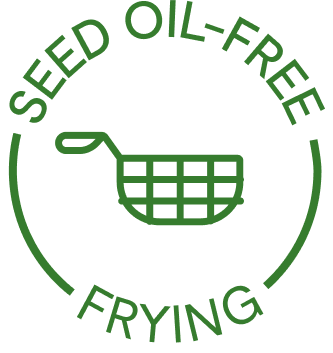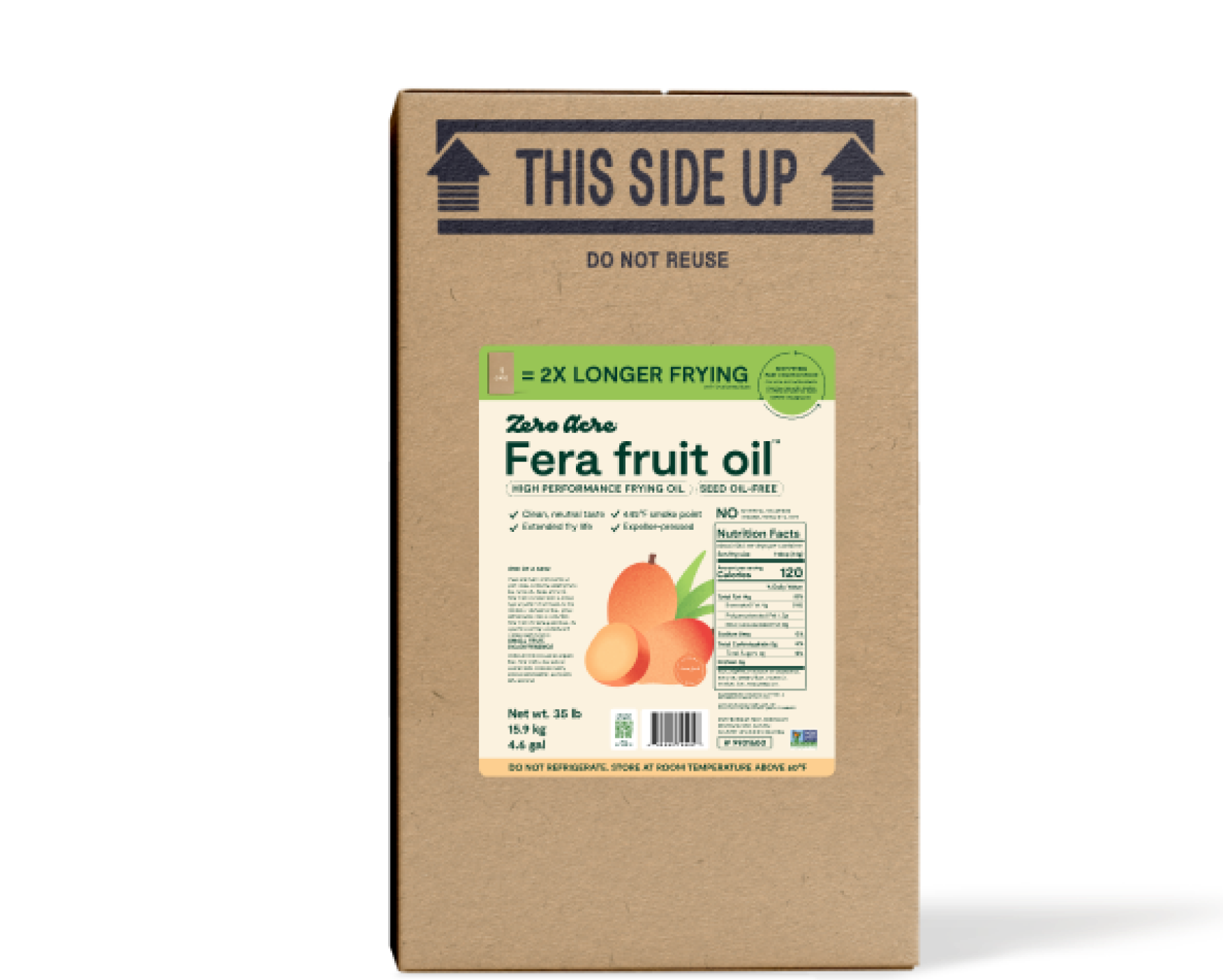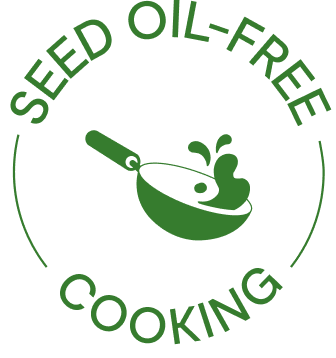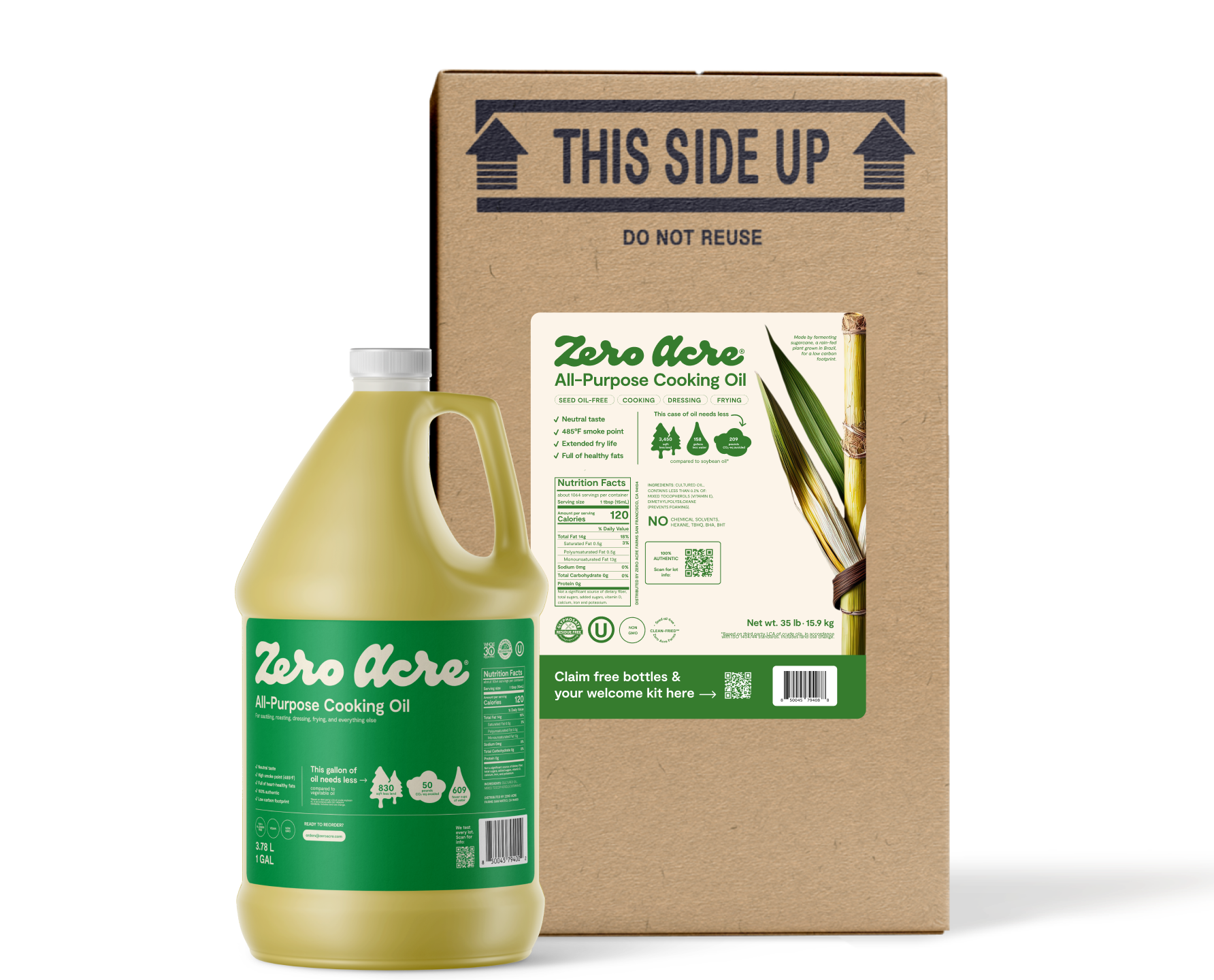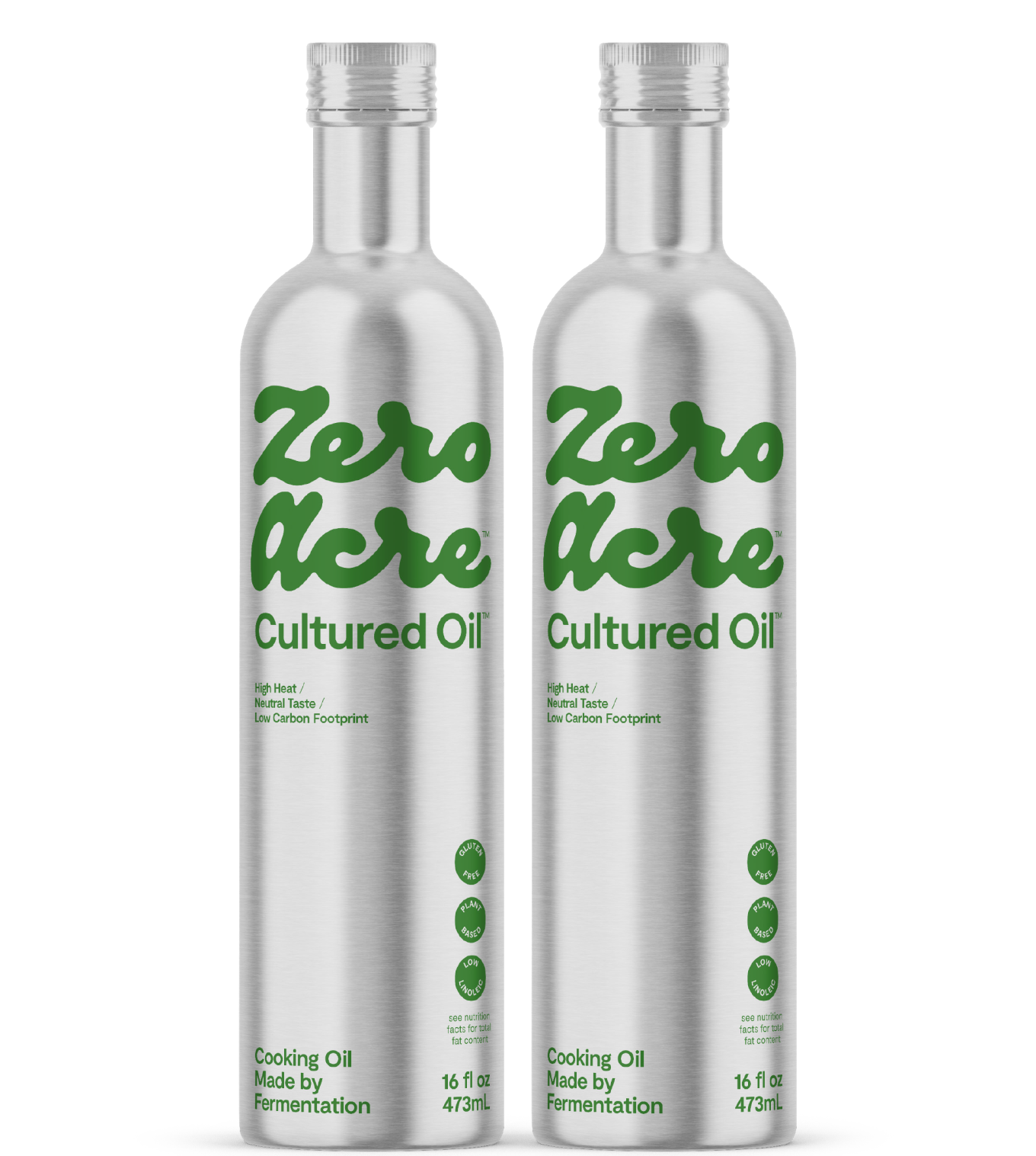WRITTEN BY: Jeff Nobbs
The majority of Americans are sick. Let that sink in. While chronic diseases were once rare, today, 6 in 10 American adults have a chronic illness such as heart disease or diabetes, and 4 in 10 have multiple chronic diseases, primarily caused by diet [*,*].
As a result, our healthy life expectancy is decreasing for the first time in recorded history [*].
Meanwhile, a chunk of forest the size of a football field is cut down every second, primarily to make way for food production, leading to record rates of biodiversity loss and carbon emissions [*].
To sum it up, we’re destroying our environment to grow foods that kill us. That doesn’t make any sense.
The single biggest change in our diets since the onset of widespread chronic health issues is the rise in our consumption of industrial “vegetable” oils, also known as seed oils [*].
Oils extracted from crops like soy, sunflower, palm, and rapeseed (canola) have exploded in prevalence over the last hundred years, from rarity to ubiquity, but only recently has our understanding of their impact on our health and environment started to catch up.
Vegetable oils are linked to obesity, heart disease, cancer, diabetes, and more. They’re also a leading driver of mass deforestation, soil erosion, climate change, and a threat to global food security.
In theory, the fix is simple: stop eating vegetable oils. In practice, it’s difficult because vegetable oils are in everything, including most packaged foods and nearly all restaurant meals, from fast food to fine dining. They’re in chips, crackers, salad dressings, stir-fries, french fries, chicken nuggets, shortenings, margarines, mayonnaises, sauces, sprays, and spreads. And there's no end in sight; vegetable oils are still the fastest growing sub-sector of global agriculture [*].
We want to change that.
Zero Acre Farms is on a mission to remove destructive vegetable oils from the food system. And we’re not going to stop until restaurant deep fryers, home pantries, and packaged foods around the world are finally free of these harmful oils and fats.
If we succeed, we think the result will be nothing short of the reversal of chronic disease and obesity rates, as well as a massive slowing of climate change and the restoration of millions of acres of natural ecosystems.
So that’s our plan. That’s what drives us, and we hope you’ll join us.
Read on to learn how vegetable oils are at the center of disease and environmental destruction, and how Zero Acre Farms plans to change that using the ancient art of fermentation.
Something’s Not Right in Our Food System
At least 60% of adults in America have a chronic disease, an increase of 700% since the first survey on the topic in 1935 [*,*].
Before modern diets and lifestyles, chronic diseases were rare, if not entirely absent. Today, these preventable diseases account for 7 in 10 deaths each year [*].
While chronic disease rates have been steadily climbing for the last hundred years, their growth has vastly accelerated in the last twenty. Between 2000 and 2010, the percentage of middle-aged adults with two or more chronic diseases jumped from 16% to 21%, and only four years later in 2014, it had increased to 32% [*,*]. Today, a full 40% of adults in the U.S. have multiple chronic diseases [*].
In addition to the pain of living with chronic disease and the devastation of losing loved ones prematurely, chronic diseases cost the world trillions of dollars. In the U.S. alone, chronic disease management accounts for 90% of our country’s $4 trillion annual healthcare expenditure –– twice as much as we spend on all our food [*,*].
And thanks in large part to the explosion of diet-related health issues, the U.S. has been experiencing a decrease in healthy life expectancy for the first time in recorded history [*].
Both a result and cause of chronic disease, obesity among adults and children has also reached an all-time high. In the U.S., 42.4% of adults have obesity–an increase from 11.9% in the 1970s–and 45.7% of school-aged children are considered overweight or obese [*,*].
Meanwhile, to feed our appetites, our planet loses 2,400 trees and 60 football fields of forested land every minute to deforestation, primarily to make way for mono-crop agriculture [*]. Over one-third of the world’s forests have already been lost, and half of this deforestation has occurred only in the last century [*].
Deforestation drives massive biodiversity loss (the world loses 137 species of plants, animals, and insects every day to deforestation) and is the second-largest contributor to climate change after fossil-fuel combustion [*,*].
It is estimated that the loss of primary forest in 2020 alone resulted in the release of more than 2.6 billion tons of CO₂ –– more than double the emissions from all cars in the United States in a typical year [*].
To say the least, something’s not right. So, what’s changed in our food system over the last hundred years that’s gotten us into this health and environmental mess?
What’s Changed?
The single most significant change in the human diet in the last hundred years is the fast-rising consumption of vegetable oils, which were widely introduced into our diet only in the last century yet are now the most consumed food in the world after rice and wheat [*].
While minimally consumed when chronic diseases were rare, vegetable oils like canola, soybean, sunflower, cottonseed, palm, and corn oil, now make up 20% of our daily calories [*].
Global production of vegetable oils has increased over 1600% since the early 1900s, has doubled in the last 20 years, and is expected to grow 30% in the next four years [*,*,*]. In the U.S., the consumption of soybean oil alone has grown 1,000-fold since 1909 [*].

There is no historical precedent for the widespread vegetable-oil consumption. Yet today, more vegetable oils are consumed globally than all beef, chicken, cheese, and shrimp combined [*].
In the case of chronic disease, while there are other diet- and lifestyle-related risk factors, only vegetable-oil consumption has increased consistently in line with increasing rates of chronic disease.
According to the Centers for Disease Control and Prevention (CDC), chronic disease is driven by tobacco use, physical inactivity, excessive alcohol, and poor nutrition.
While chronic disease rates continue to soar, Americans are actually smoking less, exercising more, drinking less alcohol, and eating “better”: we’re eating no more saturated fat, cholesterol, or sodium, and no fewer fruits, vegetables, or micronutrients than in any previous decade. And for the last couple of decades, we’ve been eating fewer total calories, fewer refined carbohydrates, and less sugar [*,*,*,*].
Vegetable oils, however, have continued on their significant upward trajectory, in line with growing rates of chronic disease. And there's no end in sight. Vegetable oil crops remain the fastest growing sub-sector of global agriculture [*].
The Impact of Vegetable Oils
The Environmental Impact
The land-use requirements for vegetable oils are growing significantly faster than any other major crop [*]. Land area for vegetable oil crops has nearly tripled since 1961 and more than doubled since the 1970s. During that same time, land area for other crops like cereals has stayed relatively flat and has actually decreased since the 1970s.

Today, more land is devoted to vegetable oil crops than to all fruits, vegetables, legumes (pulses), nuts, roots and tubers combined [*,*].
The world devotes 20-30% of all agricultural land, between 300-425 million hectares (1 billion acres), to vegetable oil crops — an area of land similar to the size of India [*,*].
Vegetable oils don’t just have massive land use requirements because of their prevalence, they are also some of the worst types of crops when it comes to land use efficiency (how much land is required to produce one kilogram of food product).
An area of land used to grow one kilogram of vegetable oil from soybean, canola, or sunflower could instead produce 30-50 kilograms of actual vegetables, like spinach, sweet potatoes, and carrots.
The result of all that land devoted to vegetable oils is deforestation, a term that broadly describes the purposeful burning or clearing of forests to make room for agriculture and other human activities. Two of the top three drivers of global deforestation are vegetable oil crops [*].
As a result, vegetable oils emit more greenhouse gases per kilogram than any other major crop. Greenhouse gas emissions from vegetable oil crops are as much as 5-25 times higher than most other agricultural crops.
In addition to the destruction of natural ecosystems, loss of biodiversity, and greenhouse gas emissions, there are additional, less obvious and more indirect, effects of widespread vegetable oil production.
In 2015, for example, the smoke from one mass burning of rainforest to make room for palm oil production is estimated to have caused 100,000 premature deaths due to harmful air pollutants [*].
Similarly, environmentally-problematic factory farms, or concentrated animal feedlot operations, are in part propagated by the production of vegetable oils. After being pressed for oil, vegetable oil crops like soybean, rapeseed (canola), sunflower, cottonseed, and corn are turned into starchy leftovers, or “meals,” that make up a large bulk of factory farm animal diets [*,*].
Without vegetable oils, there would not be such a readily available source of starchy meals for feedlot animals. Without this source of animal feed, more and more animal feedlots may make the switch to more sustainable forms of regenerative agriculture that don’t require vegetable oil leftovers as a feed source.
In other words, better oils and fats could trigger a positive domino effect in the entire food chain.
The Human Health Impact
Well-designed studies consistently show the link between the continuous consumption of vegetable oils, chronic disease, and death.
In the Sydney Diet Heart Study, a seven-year randomized controlled trial in humans (the gold-standard of evidence), increased consumption of vegetable oil was found to increase risk of death by 62% — more than physical inactivity, heavy drinking, moderate smoking, increased sugar, processed meat, or excessive sodium, when compared to risk data from other studies [*].
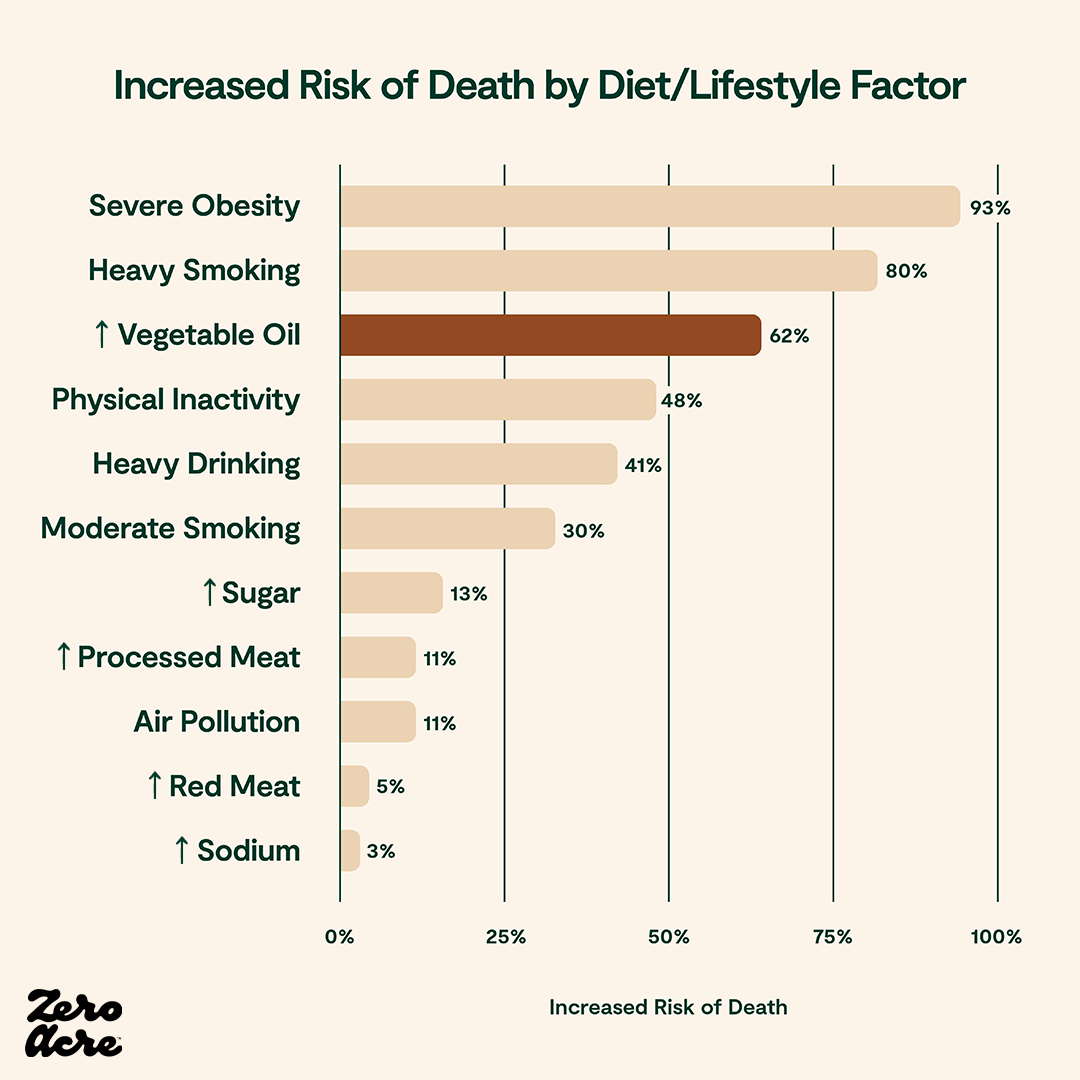
↑ = Increased consumption of; Severe obesity: BMI 35–40 [*]; Heavy smoking: ≥10 cigarettes/day (avg 21.97 or ~1 pack) [*,*]; Vegetable oil: Increase consumption by 12% of calories [*]; Physical inactivity: <2 times/week [*]; Heavy drinking: >14 drinks/week for men or >7 drinks/week for women [*,*,*]; Moderate smoking: <10 cigarettes/day [*]; Sugar: ≥73.2g sugar/day for women or ≥79.7g sugar/day for men [*]; Processed meat: Increase of at least 2 servings/week [*,*,*]; Air pollution: per 10 μg/m3 long-term exposure to PM 2.5 [*,*]; Red meat: Increase of at least 2 servings/week [*,*,*]; Sodium: >2,300 mg/day [*]
Other studies show similar results. In the Minnesota Coronary Experiment, another randomized controlled trial, participants who consumed more corn oil and margarine had 86% more heart attacks. And participants aged 65 or older increased their risk of death after just four years [*].
In the Los Angeles Veterans Administration Study, the group of participants who increased fat from vegetable oil — while keeping total fat the same — were 82% more likely to die from cancer compared to the control group that didn’t increase fat from vegetable oil. Despite randomization, the control group consuming less fat from vegetable oil had twice as many heavy smokers, but still experienced significantly fewer cancer deaths [*].
In most studies analyzing the effects of vegetable oils and health, even the best designed ones, the oils in question are consumed fresh or with light cooking; but vegetable oil appears to be most dangerous and cause the most weight gain when repeatedly heated, as is the case with deep fried foods.
It’s important to consider the effects of deep fried oil consumption on health outcomes because over a third of American adults consume foods, usually deep fried, from fast food restaurants every day [*,*]. In addition, packaged snacks, which make up a significant portion of Americans’ calories, are also typically deep fried in vegetable oils.
Fried foods are not only linked to earlier death, but also to obesity, independent of calories [*,*,*]. Even the fumes from cooking vegetable oils are linked to lung cancer [*].
In animal and human studies, as the fatty acids in vegetable oils accumulate in our bodies, they lead to a laundry list of health issues and have been implicated in weight gain, diabetes, osteoarthritis, cancer, cognitive decline, dementia, irritable bowel syndrome, coronary heart disease, macular degeneration, asthma, and autoimmune disease [*,*,*,*,*,*,*,*,*,*,*].
Like most topics in nutrition, the waters are muddied by other studies that show a benefit from vegetable oils; however, those studies measure meaningless biomarkers instead of actual health outcomes and/or are based on observational studies that hold little water when it comes to drawing causal conclusions [*,*,*].
What we know for sure is that most vegetable oils would have been impossible to consume in meaningful amounts before modern industrial processing.
We may have eaten corn and worn cotton a couple centuries ago, but we didn’t eat corn oil and cottonseed oil until the advent of processing that made it possible to squeeze minuscule amounts of oil out of grains and seeds. Not to mention the brilliant marketing that positioned the oils, which had previously been used to lubricate machinery, as a food appropriate for humans.
One would have to eat thousands of sunflower seeds, hundreds of ears of corn, or dozens of cups of rice to get the amount of sunflower oil, corn oil, or rice bran oil contained in just one typical restaurant meal.

The tiny amounts of fat in corn, sunflower, grapes, and rice are a normal part of a diet composed of actual foods, but those same fatty acids that are benign or helpful in small amounts may pose problems in large amounts, throwing off the natural balance of different types of fats within our bodies [*].
It becomes abundantly clear to anyone who has spent time reading through nutritional scientific literature that there’s a lot more we don’t know about the body than what we do know. We don’t yet fully understand what’s happening when different species in different environments eat different foods, or why those things happen.
With enough time and better science, we’ll likely figure it out. But until then, we have a chronic disease and obesity pandemic on our hands, and there are clear mechanistic data, animal studies, and human studies showing the deleterious effects of excess vegetable oil consumption. Vegetable oils are also the variable in our diet that has increased the most in the last hundred years, during which time chronic disease and obesity have gone from obscurity to commonplace. So in our fight for restored health, removing vegetable oils seems like a good place to start.
Fermentation, Not Deforestation
We believe the solution to the massive problem of vegetable oils, and the lead domino in our battle against chronic disease and deforestation, lies in the original culinary art, after fire — fermentation.
Fermentation has been used for thousands of years to make bread, beer, wine, pickles, and kimchi. We're leveraging this ancient culinary technique for a different purpose, to make healthy oils and fats that don't destroy our environment. Oils and fats made by fermentation not only have significantly lower levels of the bad fats that have been linked to disease, but also have a fraction of the environmental footprint compared to vegetable oils.
Unlike vegetable oils, Zero Acre Farms’ oils and fats made by fermentation do not introduce unprecedented amounts of novel fatty acids to the human diet. Instead, we take cues from what’s worked for thousands of years. We aim to produce zero-harm oils and fats modeled from what we evolved to eat, and we aim to make them in a more sustainable way, using fermentation as our tool.
We recognize that all tools and technology are a double-edged sword. They can be used for good or for bad. Fire is great when it cooks our food; it’s not so great when it burns down our houses. We think the key to embracing food technology, from fire to fermentation, is to be as grounded as possible in evolutionary principles and have an appreciation for what got us here, not try to outsmart nature. We use technology only to the extent that it helps us better align our biology with our environment.
Making a Viable Alternative
In today’s world, vegetable oils are extremely difficult to avoid. Even the most adamant vegetable oil critics often find themselves at a restaurant, whether fast food or Michelin-starred, with a menu full of foods fried, sauteed, or dressed in vegetable oil.
In the U.S., we are a country that loves to eat out; in fact, the majority of Americans eat out or order takeout or delivery multiple times per week [*]. And vegetable oils are found in pretty much every restaurant meal, including french fries, fried chicken, onion rings, hash browns, tortilla chips, salads, grilled meats, stir-fried vegetables, sauces and marinades. The list goes on.
To reverse chronic disease and restore natural ecosystems, it’s not enough to educate people about the problem and try to convince consumers to avoid these foods. And it’s not realistic to expect that consumers only eat home-cooked meals to avoid vegetable oils. We need a solution that will displace vegetable oils at scale, in home cooking, as well as in restaurants and packaged foods.
Healthier, more sustainable oils and fats need to become the default choice, and that requires alternatives to vegetable oils that are better — better for taste buds, better for chefs, better for food manufacturers, better for wallets, and also happen to be better for our health and the health of our planet.
To borrow an example from the strategy used by Tesla to reduce the environmental burden of gas-powered transportation: It’s not effective to try and convince everyone to take the bus to work and stop driving. We need to make alternatives, like electric cars, that are not only safer and have a lower carbon footprint, but are simply better cars.
Our dream is for everyone everywhere in the world to be able to enjoy the foods they love without destroying their health or the planet’s. Fat makes food delicious, and delicious food doesn't have to be unhealthy or unsustainable — nor require a sacrifice.
Giving up cheeseburgers, croissants, and cake is a conscious decision to stop eating delicious food, for the sake of one's health or the greater good. That's hard — really hard. It's the reason most diets don't work. Giving up vegetable oil is just as hard right now, because it's in everything. But in a world where better fat is the default choice, it's not hard to give up a food that you’re barely aware you consume in large amounts in the first place. Most people may not even notice the upgrade.
The Path Forward
If there’s anything worth fighting for, it’s having more years of a happy, healthy life with loved ones, reducing the suffering of humans and all other life, and ensuring that everyone can enjoy the world around them for years to come.
Health and sustainability should go hand in hand. We shouldn’t eat foods that are good for the planet at the expense of our health, nor the other way around. Either there won’t be any healthy people around to enjoy the planet, or there won’t be any healthy planet left for people to enjoy.
Unlike crusades against factory farms, refined carbohydrates, sugar, cigarette smoking, fossil fuels, and other problematic industries, no one has worked on solving the important problem of eliminating vegetable oils at scale — until now.
A couple of years ago, a few of us got together and started Zero Acre Farms with the mission to remove destructive vegetable oils from the food system.
Selfishly, as a team of food lovers, we look forward to the day when we can eat out at a restaurant and not worry whether the food is slowly killing us. When we can enjoy foods cooked in oil and fat without wondering how many acres of rainforest were destroyed, or how much closer another species came to extinction, as a result of our meal.
We are partnering with chefs, climate scientists, nutritionists, MDs, PhDs, and celebrities that can influence change. We want to send an important message to the world that vegetable oils are a problem, and there’s a better way, with better fat.
If we could snap our fingers and remove all vegetable oils on the planet, we think the result would be nothing short of the reversal of chronic disease and obesity, as well as a massive slowing of climate change and the restoration of millions of acres of natural ecosystems.
So let's build toward that better future. Let’s give the world an oil change. It may not happen as quickly as the snap of our fingers, but all important journeys begin with one step.
In the case of eradicating vegetable oils, that first step is now.
Better oils and fats are coming soon. To stay up to date on Zero Acre Farms’ fight against destructive vegetable oils, sign up for our newsletter.
The role of vegetable oils in health and climate is a complex topic. If you have any questions, email us at questions@zeroacre.com.

